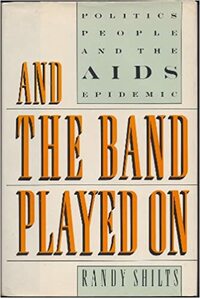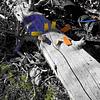Take a photo of a barcode or cover
informative
challenging
emotional
informative
medium-paced
challenging
dark
emotional
informative
reflective
sad
slow-paced
Moderate: Death, Homophobia, Sexual content
finally read so many years after hearing isabel talk about it freshman year — now want to revisit “let the record show” since Shilts’ book ends as the epidemic is only getting off the ground, before ACT UP is founded (features Larry Kramer as a protagonist but without the broader organizing)
thoughts to come
thoughts to come
emotional
informative
reflective
at the time that it happened to be that I was reading it, early winter of 2019, I was looking around and noticing it felt awfully familiar....
When written this was a book about one tragic response to a pandemic virus. I’ve waited long enough. I’ve waited long enough to read this that it has become the tragic tale of a second pandemic.
From the prologue:
“There was no excuse, in this country and in this time, for the spread of a deadly new epidemic. For this was a time in which the United States boasted the world’s most sophisticated medicine and the world’s most extensive public health system, geared to eliminate such pestilence from our national life.”
And slightly later:
“It is a tale that bears telling, so that it will never happen again, to any people, anywhere.”
Of course, it did happen again. With many differences. But this book cataloged the errors so we wouldn’t make them again. But we rarely improved.
We did not learn how to keep politics out of public health. (To be fair, the respective presidents created vastly different political problems. Though in both cases it wasn’t just the right cause problems with politicization).
We did not learn how to talk to people who had legitimate concerns. Instead, we dismissed those concerns about anti-COVID-19 measures as unfounded just as the concerns of gay men about being told what to do shortly after gaining incomplete freedoms were also dismissed.
We did not learn to respect the lessons of other nations. Heck, the opening quote reflects one of the biggest errors of the COVID-19 era, and one Shilts was complicit in. American exceptionalism played such a part in our flawed response to COVID-19. Instead of learning from other nations, nations which were far more successful in controlling SARS-CoV-2, many of those being so called 3rd World countries, we insisted on making our own playback, ignoring the lessons behind their successes.
I could keep going on, but I won’t.
There are some things we did better—funding was readily available. And the drug pipeline was accelerated. The wisdom of the “Project Warp Speed” name aside, Warp Speed filled in a huge gap where FDA and scientists insisted during the early years of AIDS on moving potential treatments at the standard slow pace.
We also made incredible strides in biosafety. Granted, Shilts only mentioned the issues because it helped tell a story about the lack of funding, but dear God the months Don Francis had to wait for approval for a couple bucks of changes to door to prevent contaminated gloves being used on door knobs was frightening.
This is a book that tell us what might have been, if only we had paid more attention.
I should say a bit about the book itself. It’s not without its flaws. I’ve already mentioned the unfortunate way it looks down on other, especially poorer, countries. There are some technical errors (errors known at the time, not just where our understanding has changed), but I don’t think those are much worth mentioning—this isn’t a book about the science so much as how science and people interrelate.
I do need to comment on the structure. This book is told in incredible depth chronologically. Many of the chapters are a single month, with sections about specific days. It shows the incredible work that Shilts put into this work. At times it is incredibly affecting, such as when we follow individuals living before and after AIDS diagnoses, leading up to their inevitable deaths.
But a lot of the time it just feels repetitive. Oh, here’s yet another incidence where the Reagan administration was doing their best to screw over funding for AIDS research. Here's another time when the media refused to pay attention no matter how shocking the news. Here’s another time when gay activists prevented measures being taken (often out of legitimate concerns, though Shilts looked at that less than he might have).
I imagine the blow by blow may work better for some readers, but with a few exceptions it just overloaded an already very long book.
From the prologue:
“There was no excuse, in this country and in this time, for the spread of a deadly new epidemic. For this was a time in which the United States boasted the world’s most sophisticated medicine and the world’s most extensive public health system, geared to eliminate such pestilence from our national life.”
And slightly later:
“It is a tale that bears telling, so that it will never happen again, to any people, anywhere.”
Of course, it did happen again. With many differences. But this book cataloged the errors so we wouldn’t make them again. But we rarely improved.
We did not learn how to keep politics out of public health. (To be fair, the respective presidents created vastly different political problems. Though in both cases it wasn’t just the right cause problems with politicization).
We did not learn how to talk to people who had legitimate concerns. Instead, we dismissed those concerns about anti-COVID-19 measures as unfounded just as the concerns of gay men about being told what to do shortly after gaining incomplete freedoms were also dismissed.
We did not learn to respect the lessons of other nations. Heck, the opening quote reflects one of the biggest errors of the COVID-19 era, and one Shilts was complicit in. American exceptionalism played such a part in our flawed response to COVID-19. Instead of learning from other nations, nations which were far more successful in controlling SARS-CoV-2, many of those being so called 3rd World countries, we insisted on making our own playback, ignoring the lessons behind their successes.
I could keep going on, but I won’t.
There are some things we did better—funding was readily available. And the drug pipeline was accelerated. The wisdom of the “Project Warp Speed” name aside, Warp Speed filled in a huge gap where FDA and scientists insisted during the early years of AIDS on moving potential treatments at the standard slow pace.
We also made incredible strides in biosafety. Granted, Shilts only mentioned the issues because it helped tell a story about the lack of funding, but dear God the months Don Francis had to wait for approval for a couple bucks of changes to door to prevent contaminated gloves being used on door knobs was frightening.
This is a book that tell us what might have been, if only we had paid more attention.
I should say a bit about the book itself. It’s not without its flaws. I’ve already mentioned the unfortunate way it looks down on other, especially poorer, countries. There are some technical errors (errors known at the time, not just where our understanding has changed), but I don’t think those are much worth mentioning—this isn’t a book about the science so much as how science and people interrelate.
I do need to comment on the structure. This book is told in incredible depth chronologically. Many of the chapters are a single month, with sections about specific days. It shows the incredible work that Shilts put into this work. At times it is incredibly affecting, such as when we follow individuals living before and after AIDS diagnoses, leading up to their inevitable deaths.
But a lot of the time it just feels repetitive. Oh, here’s yet another incidence where the Reagan administration was doing their best to screw over funding for AIDS research. Here's another time when the media refused to pay attention no matter how shocking the news. Here’s another time when gay activists prevented measures being taken (often out of legitimate concerns, though Shilts looked at that less than he might have).
I imagine the blow by blow may work better for some readers, but with a few exceptions it just overloaded an already very long book.
challenging
dark
informative
reflective
slow-paced
In times of historical and political turmoil, it is important to go back and see how our communities survived in times of past obstacles to progress. For me, I always retreat in queer history and how the past century has shaped this movement. The one tragedy I come back to is the AIDS epidemic. It feels wrong to say that this epidemic is my special interest but I return to it often, as though the resilience that emerged from the community fuels me to keep going through the trenches of history while honoring the many people we lost to senseless bigotry and ignorance.
While reading the book, I found myself becoming angrier and sadder with each passing paragraph; there is a reason it took me almost three months to finish this book. With every little victory came backlash and more red tape. Public health became infiltrated with politics and politics drove public health backward. So many lives could have been saved in the early days when they had time. Time. Time. Time. That word was repeated over and over again and no one took it seriously until almost 6 years into the epidemic (though it could be traced back to the mid-70s). It was all so preventable and the powers at be did nothing to stop it.
The thing that breaks my heart most is that Randy, who died in 1994 due to HIV/AIDS, did not live to see where we are now. While the disease is nowhere near cured, there are ways to avoid the gruesome and lonely deaths of the early days. Many people who are HIV+ are able to live full and healthy lives with the right treatment. With his research and reporting, the public was able to see how the government allowed the disease to spread all because it started as "a gay disease."
If any of my friends and followers were shocked by the inaction of the US government in their response to COVID, you should read this book. All of the foundation was laid there, along with the stigma and capitalistic forces that will stand in the way of progress in public health, social justice, and socioeconomic equality.
To those working in science and public health yesterday, today, and tomorrow: I know your job is hard and often thankless. Nonetheless, thank you for your efforts, research, and passion for this field.
May those who died in the Before rest in peace. You deserved so much more than what you were given. You are not forgotten.
And rot in the deepest pit of hell, Ronald Reagan ❤️
While reading the book, I found myself becoming angrier and sadder with each passing paragraph; there is a reason it took me almost three months to finish this book. With every little victory came backlash and more red tape. Public health became infiltrated with politics and politics drove public health backward. So many lives could have been saved in the early days when they had time. Time. Time. Time. That word was repeated over and over again and no one took it seriously until almost 6 years into the epidemic (though it could be traced back to the mid-70s). It was all so preventable and the powers at be did nothing to stop it.
The thing that breaks my heart most is that Randy, who died in 1994 due to HIV/AIDS, did not live to see where we are now. While the disease is nowhere near cured, there are ways to avoid the gruesome and lonely deaths of the early days. Many people who are HIV+ are able to live full and healthy lives with the right treatment. With his research and reporting, the public was able to see how the government allowed the disease to spread all because it started as "a gay disease."
If any of my friends and followers were shocked by the inaction of the US government in their response to COVID, you should read this book. All of the foundation was laid there, along with the stigma and capitalistic forces that will stand in the way of progress in public health, social justice, and socioeconomic equality.
To those working in science and public health yesterday, today, and tomorrow: I know your job is hard and often thankless. Nonetheless, thank you for your efforts, research, and passion for this field.
May those who died in the Before rest in peace. You deserved so much more than what you were given. You are not forgotten.
And rot in the deepest pit of hell, Ronald Reagan ❤️
Graphic: Chronic illness, Death, Homophobia, Terminal illness, Medical content, Medical trauma, Pandemic/Epidemic
Moderate: Hate crime, Religious bigotry, Classism
Minor: Alcoholism, Vomit, Abortion








